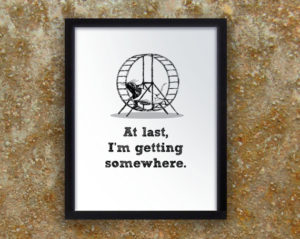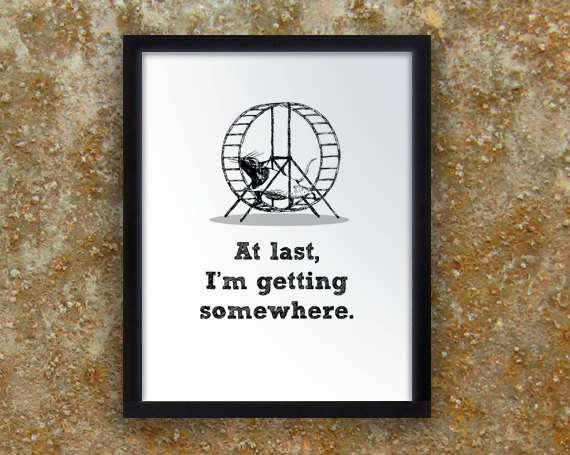
Our responses to people and situations can become so automatic that really, we have a habit and we do the emotional response with NO THINKING involved.
This is fine if we have good habits like eating our broccoli and going to bed early. But what if we have the emotional equivalent of smoking? You might thing that’s not possible, but have you ever felt excited to see the ex who verbally shat on you? Maybe you’ve gotten so angry that you couldn’t speak when you were questioned and felt stupid afterwards . Maybe you know someone who can’t understand why they keep going back to an abusive job/relationship. Or maybe you’ve given up alcohol and now you have to avoid the family Thanksgiving because those idiots are going to try and get you to drink. Anything that interferes with your functioning, sends you running towards pain, or encourages painful behavior from others, hey! That’s a bad habit.
The problem with habits is they don’t actually respond to will power where we most want to apply it. Think about the drunk in the bar with the whiskey in front of him trying to say NO! And I’m thinking, why worry at this point? Drinking the whiskey is a forgone conclusion if you wait till it’s in front of you. The place to apply a well intentioned “NO” was way before you already ordered the drink, made the whole pan of brownies, stayed late enough that you might as well just keep working. Habits are a response to a stimuli, but the bad things we do to ourselves and others are not the precipitating stimuli! That happens way before the bad behavior we want to stop.
Emotional habits are the same. By the time you’re trying to stop yourself from responding to your mother like an angry adolescent, you’re in deep and you might as well let it rip.
When we say the word habit, we tend to mean one little tiny part of a much larger cycle of behavior. He smokes, what a bad habit. Yes, but he also gets antsy at his desk, likes to get out of the office, needs to deal with stress, has a friend in the office that agrees with him politically on their smoke breaks, and likes the moment when the cashier asks him what brand he’d like and he remembers his dad asking him to pick by color. ALL of that is the habit, not just the moment he lights up.

So if you have a habit of responding to another person in a way that hurts you or never gets what you want, start changing it by getting the rest of the picture. What are the triggers? Where did they start? What is the whole process? When do you start feeling the urge and what is happening right before that? What are the rewards?
Our brains are tricky. The reward can be something you’re actually getting, or just something you really believe you’ll get. If you’re doing an emotional habit because you need to feel loved by someone like your father, then you will not stop the behavior until you figure out how to take care of that need some other way. Even if NONE of the previous attempts have been successful. You’re not stupid or crazy! You’re just trying to get what you need. If you can admit what that need is, you can find a better way to deal with it, you can sense when it’s about to derail you and get back on track before old habits make the same old train wreck!
Ask yourself the same questions about triggers, process, urge, timing and reward when someone else is habitually hurting you. What are they responding to and is it something you could change? Or are they so caught up in their own habit that you need to accept the behavior won’t change and get protective of yourself?
But what if you’re changing and your own parents try to sabotage you? What if you have family members that have always treated you badly?
When it’s your family and they are undermining all your efforts to do better/ get better. That’s a habit on their part that probably starts in their fear. If you change, will they have to look at themselves and the family differently? What function does your behavior serve? Don’t tell me it doesn’t. I’ve seen way too many families that arrange themselves around one member’s addiction or bad behavior. They do NOT know what to do if you make real changes! Or maybe if you get better, you won’t need them anymore. I’ve seen that drive a lot of sabotage.
Don’t take it personally when the other person has a habit. It will take at least 30 days of you acting differently for them to believe in your change, (if you’re lucky). After that it will take them a while to change how they react to you. It’s easier if they are trying to make changes. It doesn’t mean that it’s impossible if they’re not. Habits have triggers, if your behavior is no longer the excuse they’re using for theirs, you tend to get change. If you’ve changed and they can’t/won’t/don’t change, put it to them directly. “I’m loosing weight and feeling good so why are you putting out donuts constantly and asking me if I’m sick all the time?” If they don’t/won’t respond or change, you may have to change the boundaries in that relationship. More painfully, you may just have to accept that is who they choose to be and make good choices for yourself about being in that relationship. Sometimes, you need to get out.
A great book on this subject that I hand out to clients all the time is “The Power of Habit” by Charles Duhigg. It’s a great place to start learning about why you do certain behaviors with no conscious decision making involved. So If you’ve been frustrated by how people ask you later about why you made such a bad choice and you seriously don’t have an answer, read this book. Once you figure out the stimuli and the needs you’re trying to meet, you can take control and make habits work for you!
I look forward to any questions you’ve got!

